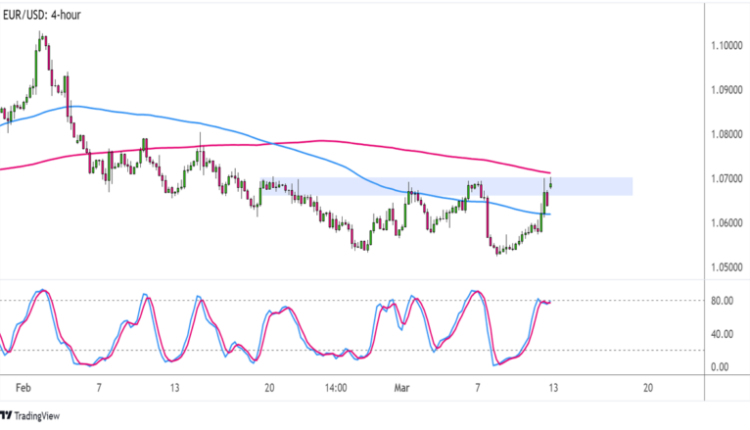Week Ahead in FX (Mar. 13 – 17): Another Busy Week with ECB, U.S. Inflation and Spending Data
Think the fireworks in the forex market ended with last week’s NFP?
Think again!
It’s gonna be another busy one with these upcoming major events.
Before all that, ICYMI, I’ve written a quick recap of the market themes that pushed currency pairs around last week. Check it!
And now for the closely-watched potential market movers this week:
Major Economic Events:
U.S. inflation figures (starting Mar. 14, 12:30 pm GMT) – Time to see if U.S. data will keep supporting the Fed’s hawkish views!
We’ve got Uncle Sam’s February CPI reports coming upon Tuesday’s New York session, and analysts are expecting a bit of a slowdown from from 0.5% to 0.4% for the monthly reading.
This might drag the year-over-year CPI down from 6.4% to 6.0% for the month while the core figure could show another 0.4% uptick.
Next up, the PPI readings are due on Wednesday, and these are slated to show slower underlying price pressures as well. The headline figure is projected to have fallen from 0.7% to 0.3% month-over-month in February while the core version of the report likely dipped from 0.5% to 0.4%.
U.S. retail sales (Mar. 15, 12:30 pm GMT) – Market watchers will also have a look at the state of consumer spending, which probably slowed in the previous month as well.
Headline retail sales are estimated to have declined by 0.3% in February, erasing part of the 3.0% gains earlier, while core retail sales could chalk up a 0.1% downtick after the earlier 2.3% jump.
Weaker than expected results could turn the spotlight to a shaky consumer sector and cast doubts on whether or not the Fed can pursue an aggressive tightening bias.
New Zealand Q4 GDP (Mar. 15, 9:45 pm GMT) – Next up we’ve got the latest growth figures from New Zealand, although the actual results might point to a contraction for the last quarter of 2022.
Analysts project a 0.2% dip in GDP for the period, a far cry from the earlier 2.0% expansion and probably enough to spur speculations of a tightening pause from the RBNZ. An upside surprise or a positive reading, on the other hand, might mean another leg higher for the Kiwi.
Australian employment report (Mar. 16, 12:30 am GMT) – A strong rebound in hiring is eyed for the Land Down Under, as the February employment change could come in at 49.7K after the earlier reduction of 11.5K.
This could be enough to bring the unemployment rate down a notch from 3.7% to 3.6%, but of course the underlying components are still likely to carry some weight. Weak spots in the Australian labor market could reinforce not-so-hawkish expectations for the RBA, which might drag the Aussie further south.
ECB monetary policy statement (Mar. 16, 1:15 am GMT) – Last but certainly not least is the ECB decision, which is likely to come with a 0.50% interest rate hike from 3.00% to 3.50%.
Recall that several ECB officials have been reiterating the need to do more in order to keep inflationary pressures in check, with some even citing that more aggressive measures are warranted. Just watch out for hints on their next policy moves to gauge how the shared currency might react.
Forex Setup of the Week: EUR/USD

EUR/USD 4-hour Forex Chart by TradingView
It looks like EUR/USD is ready to call it quits with this downtrend!
The pair made a couple of failed attempts to break below the 1.0550 area and is testing resistance around 1.0700, creating a double bottom pattern.
A break above the neckline could set off a rally that’s the same height as the formation, which spans around 150 pips. Price also has to clear the upside barrier at the 200 SMA dynamic resistance to confirm a reversal.
Stochastic is suggesting that sellers might still put up a fight, though, as the oscillator is nearing the overbought zone.
This could all boil down to the outcome of top-tier catalysts from the U.S. and the eurozone, although it looks like fundamentals are favoring the latter.
After all, the ECB is poised to announce a 0.50% rate hike while inflation and spending reports from the U.S. might reflect a bit of a slowdown.


Comments are closed.